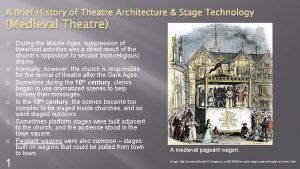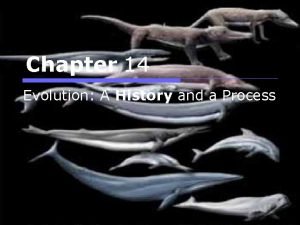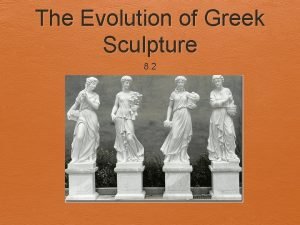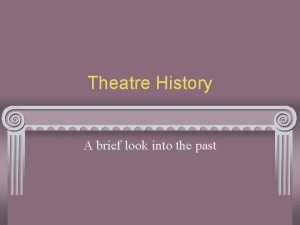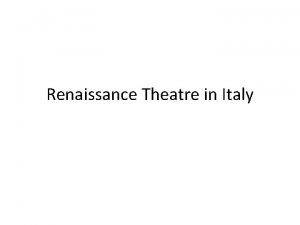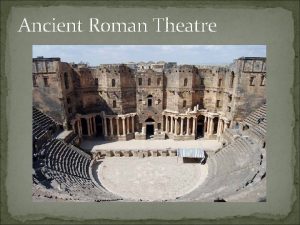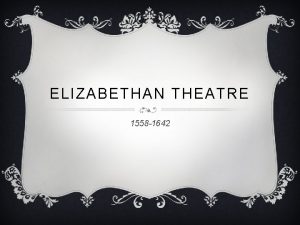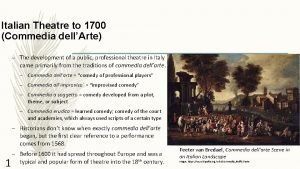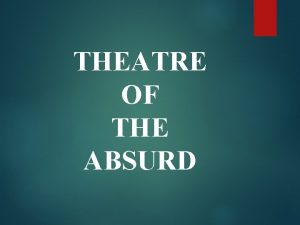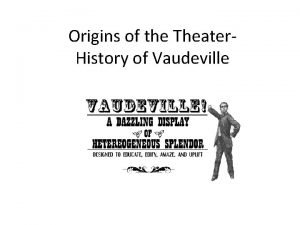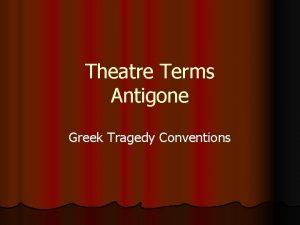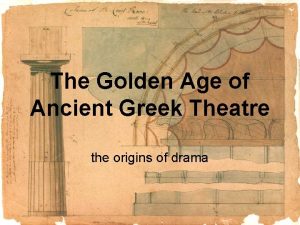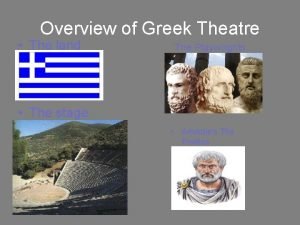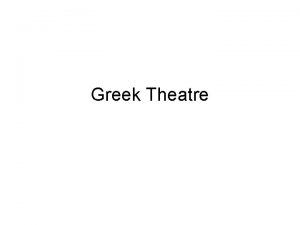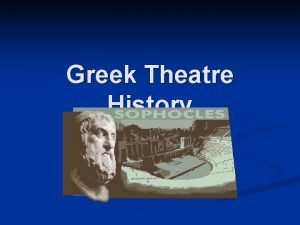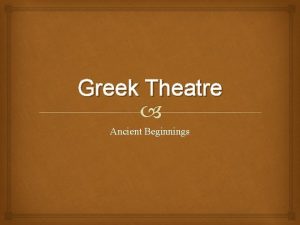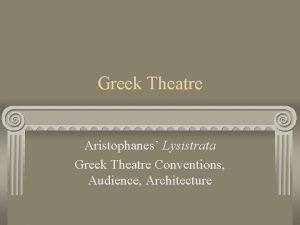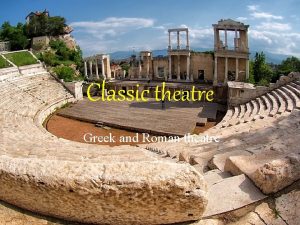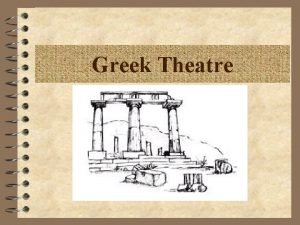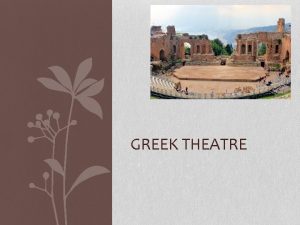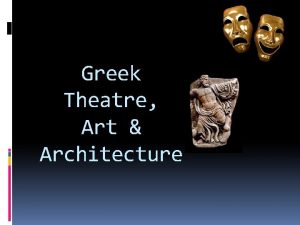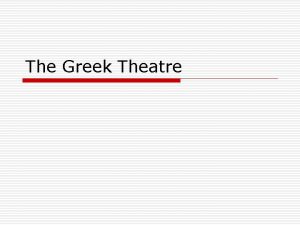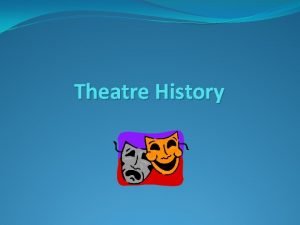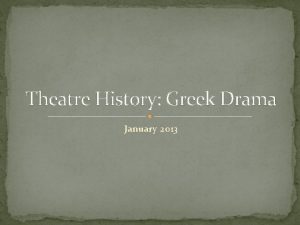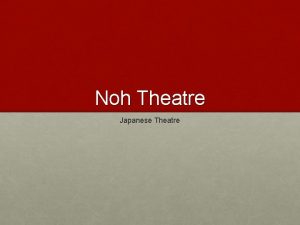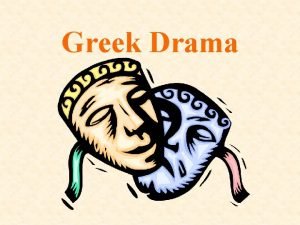GREEK THEATRE HISTORY Evolution of Greek Theatre Religious







































- Slides: 39

GREEK THEATRE HISTORY

Evolution of Greek Theatre � **Religious ceremony with goat sacrifice � **Presentation style with chorus and 1 -3 actors � **Competition

The Greek Drama began with Greek religion. Primitive celebrations in honor of the god of wine and fertility , Dionysus, included a group of chanting dancers around an altar.

RELIGIOUS SACRIFICE During the religious celebration of the god Dionysus, a group of men danced and chanted around the altar. The chant was called the dithyramb. The chant evolved into Greek Tragedy Plays and the dancers became known as the chorus.

The Greek word “tragos” is translated into English as tragedy. It literally means “goat song” – the sound the goat made as it was being sacrificed. The word tragedy implies death; therefore, in a Greek Tragedy all the main characters die.

CONVENTIONS CHANGE… The process of moving from a sacrificial altar in a religious ceremony took several hundred years. By the fifth century B. C, called the Golden Age of Greece, a religious celebration, called the City Dionysia, had replaced the sacrifice. The sacrifice was replaced with a performance by the chorus before an audience.

TRAGEDY AND COMEDY The festival ended with a competition between playwrights. Each competitor presented a tragic trilogy. After many years, a satyr play was added, a precursor to comedy. Comedy originally meant that characters did not die. The winner was awarded with the coveted laurel wreath.

THESPIS One of first contests was held in 534 BC and a man named Thespis of Attica was the winner.

THESPIS Thespis is legendary for being the man who “invented” acting. Legend states that he was a writer and actor and he stepped out of the chorus and spoke the first words ever spoken alone by a chorus member – making him the first actor! (That’s why actors are still called Thespians)

THREE ACTORS & THE CHORUS The addition of one actor by Thespis, was later followed by the addition of two more actors. This means that in most plays from the period, only three actors played all the major roles.

THE THEATRE The theatre itself had evolved from a cleared space at the foot of a hill into a grand, open-air amphitheater.

THEATRE OF DIONYSUS Plays were performed from March through April. It is estimated that 14, 000 to 17, 000 people might have attended each play. Plays were only performed once.

PARTS OF THEATRE � � � The theatre was carved from a hillside, providing bench-style seating for very large crowds. The audience seating area was known as the Theatron, or Seeing Place. The chorus entered the Orchestra, also known as the Dancing Place through the Paradoi (pleural for parados) Actors changed costumes in a building called the Skene, in front of which was a raised platform called the Proskenion (remember proscenium? )


Theatre of Epidaurus � https: //www. youtube. com/watch? v=v. NAM 3 Pz. G cow&list=PLJuf 9 Hnx. GVrx. Qh. BU 5 Y 6 Opmzq. D 1 B a. Xk. BW_&index=16

THEATRE MASKS Because the plays were performed in such large outdoor theatres, actors may have worn elevator shoes, tall headpieces, and large masks. The masks may have functioned as a miniature megaphone, helping to project the actor’s voice. In addition, the use of masks made it relatively simple for one actor to play several parts, including a woman (since women were not allowed to act).

SPEECH IN GREEK THEATRE Actors spoke in long, loud, declamatory speeches directed at the audience, using large arm gestures. There was little realism in their speech. Chorus members spoke loudly and slowly in order to speak in unison.

SETS The first attempt at scenery was to use the skene to represent several different locales by placing painted panels in front of the front wall. The second and most successful scenery shifts were accomplished through use of periaktoi.

Periaktoi � - triangular prisms which could be pivoted to reveal three different backgrounds

ECCYCLEMA Dictated by the convention that all violence must take place off-stage, out of sight of the audience. Usually a messenger or other character would enter and tell about the murder, or suicide, or whatever. Sometimes the telling would be accompanied by the wheeling in of the eccyclema, a wheeled platform we’d call a wagon today, containing the mangled and bloody bodies.

MONTY PYTHON’S HOLY GRAIL � https: //www. youtube. com/watch? v=grb. SQ 6 O 6 k bs&list=PL 784 AA 73 D 8 C 1 C 4 BAB&index=2

CONVENTIONS In each period of history and in different cultures, there are standards of what is proper and acceptable. These special practices are called social conventions. Theatre reflects the social conventions of the time.

DEUS EX MACHINA A crane-like machine by which an actor playing the part of a god and riding in a large basket could be lowered onto the stage from above. This deus ex machina (god from the machine) was used as a device to conveniently assist the human characters in solving their problems by divine intervention. The phrase is still used to indicate a coincidence which happens at just the right time to save someone (in a play or in life) from disaster.

ARISTOTLE Aristotle is a famous Greek philosopher, scientist, and educator born in 384 BC. Best known for his practical theories, he was a student of Plato and teacher of Alexander the Great

Aristotle Defines Tragedy “Tragedy is an imitation of an action that is serious, complete, and of a certain magnitude, in the form of action, not of narrative; through pity and fear effecting the proper purgation of emotions” (have you ever cried at a movie? gripped the edge of your seat? this would be a purgation)

The Greek Playwrights � Much of what we know about Greek theatre comes from the few surviving scripts of three great writers of tragedy and one comic playwright. � Aeschylus � Sophocles � Euripedes � Aristophanes

SCRIPTS…. PARTIALLY There were hundreds of plays written by these great playwrights. Only about 40 of them remain today.

AESCHYLUS Aeschylus (525 -456 B. C. ) is often called the Father of Tragedy. His most famous work is the Oresteia Trilogy.

THE ORESTEIA TRILOGY � In Agamemnon, the first play of the trilogy, Agamemnon returns from ten years of fighting a war. He acts with hubris (a sinful excess of pride) and is killed by his wife, Clytemnestra, who has never forgiven him for sacrificing their eldest daughter to the gods before the war. � This murder triggers vengeance. It was a religious obligation of the Greeks to avenge a wrong done to one’s family, and in The Libation Bearers, Electra - the remaining daughter of Agamemnon - talks her brother, Orestes, into killing their mother. � The final play of the trilogy, The Furies, finds Orestes being chased and hounded by supernatural Furies. His sin, of course, is that of matricide (killing mom). In the end, Orestes is pardoned by the gods – deus ex machina.

SOPHOCLES Sophocles (497 -406 B. C. ) was responsible for the addition of the third actor to the stage. He wrote over 100 plays, winning the City Dionysia prize 18 times, only 7 of his plays have survived. His most famous trilogy is OEDIPUS REX.

Oedipus Rex (Oedipus the King) � Tells the story of Oedipus saving the city of Thebes. The cost ? Discovering that he has murdered his father and married his mother in an effort to avoid exactly that fate. His mother-wife kills herself, and Oedipus blinds himself and condemns himself to exile and life as a blind beggar. � The rest of his life, and his death , is the story of the second play, Oedipus at Colonus. � The trilogy ends with Antigone, in which Oedipus’ younger daughter, Antigone, sacrifices her life in a futile attempt to fulfill another important religious obligation that of burying the dead.

Oedipus to Antigone � https: //www. youtube. com/watch? v=QVt. M 3 BDv J 0 w&index=4&list=PL 784 AA 73 D 8 C 1 C 4 BAB

EURIPEDES � Euripedes (480 -405 B. C. ) was the youngest, most modern, and least popular of the three great writers of tragedy. � He appealed to the emotions by including in his plays a look at the small details of the daily lives of his characters.

� Medea tells of the mythological sorceress who helped Jason win the Golden Fleece. After their marriage she continues to help Jason in his rise to power, but he abandons her for Glauce, a daughter of Creon. Driven mad by her jealousy, Medea takes her revenge on Jason by gruesomely murdering their two children. � The Trojan Women is one of the most powerful antiwar plays ever written.

TRAGIC GREEK PLAYWRIGHTS �Aeschylus wrote about gods, �Sophocles wrote about heroes, �Euripedes wrote about men.

ARISTOPHANES Eleven surviving plays of Aristophanes (445 -380 B. C. ) are the only examples we have of what is called Old Comedy. Aristophanes wrote funny, and therefore very popular, social satire. He poked fun at public figures such as Socrates in his play The Clouds and Euripedes in his play The

Lysistrata In Lysistrata, the title character decides to put an end to war. She calls the other wives to a secret meeting and convinces them all to shut themselves away from their husbands until they end the war. In the end, Lysistrata dictates the terms of surrender.

MENANDER Wrote New Comedy. Only fragments of his plays had been found, and most of what we know of his works was learned from studying Roman playwrights who copied him. Menander wrote comedies dealing with daily life and domestic situations. His plays featured characters such as clever servants, protective fathers, and young lovers - types who have been standards in the comic theatre ever since!

From Ritual to Theatre � https: //www. youtube. com/watch? v=l. QOPFxuia WQ&list=PL 784 AA 73 D 8 C 1 C 4 BAB&index=6
 Timeline of greek theatre
Timeline of greek theatre Greek theater characteristics
Greek theater characteristics Religious fundamentalism definition ap world history
Religious fundamentalism definition ap world history Greek and roman art similarities
Greek and roman art similarities Medieval theatre architecture
Medieval theatre architecture The evolution of musical theatre
The evolution of musical theatre Tqm history
Tqm history History and evolution of repertory
History and evolution of repertory Facility management history and evolution
Facility management history and evolution Garde manger history
Garde manger history First card repertory
First card repertory Doctrine of analogy in repertory
Doctrine of analogy in repertory History and evolution of health information technology
History and evolution of health information technology Chapter 14 evolution a history and a process
Chapter 14 evolution a history and a process Archadic
Archadic Looking at theatre history
Looking at theatre history Globe theatre structure
Globe theatre structure Italian theatre renaissance
Italian theatre renaissance Ancient roman plays
Ancient roman plays What is physical theatre
What is physical theatre French renaissance theatre history
French renaissance theatre history History of elizabethan theatre
History of elizabethan theatre What is the shared history of theatre and games?
What is the shared history of theatre and games? What is realism in theatre
What is realism in theatre Italian theatre history
Italian theatre history Theatre architecture history
Theatre architecture history Western theatre history
Western theatre history Medieval theatre timeline
Medieval theatre timeline Main features of elizabethan theatre
Main features of elizabethan theatre Elizabethan theatre history
Elizabethan theatre history Greek dramaturgy
Greek dramaturgy Australian theatre history
Australian theatre history Theatre of the absurd history
Theatre of the absurd history Renaissance theatre history
Renaissance theatre history Vaudeville origins
Vaudeville origins Kneehigh theatre history
Kneehigh theatre history Elizabethan theatre history
Elizabethan theatre history Greek tragedy terms
Greek tragedy terms When was the golden age of greek theatre
When was the golden age of greek theatre Greek tragedy playwrights
Greek tragedy playwrights




